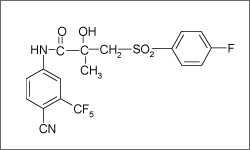Bicalutamide

Bicalutamide is used to treat metastatic prostate cancer in conjunction with other drugs called luteinizing hormone-releasing hormone (LHRH) analogues, such as goserelin and leuprolide. Bicalutamide is taken in tablet form usually once a day while taking LHRH treatment.1
- 1 Casodex.. Prescribing Information. Zeneca Pharmaceuticals. 2015. [http://www.azpicentral.com/casodex/casodex.pdf#page=1]
Bicalutamide (Casodex®) is an anti-androgenic molecule that blocks the effects of androgens (sex hormones), such as testosterone. It prevents testosterone's binding to necessary receptors in cells. In certain tissues androgens control the growth and division of cells, normal and cancerous. Bicalutamide is used in the treatment of prostate cancers, which are dependent on testosterone for growth control. By blocking the growth enhancing activities of testosterone in cancerous cells treatment with bicalutamide can result in a decrease in tumor size or a delay in tumor growth.1
The diagram below shows the molecular structure of Bicalutamide.
- 1 Chu, E., & DeVita, V. T. (2015). Physicians' cancer chemotherapy drug manual 2015. Burlington, MA: Jones & Bartlett Learning.
Common side effects include: hot flashes, decreased libido, impotence, general pain, pelvic and back pain weakness, constipation. Though very rare there is a chance that liver toxicity can occur during treatment with bicalutamide. Patients with pre-existing liver conditions should be cautious be receiving this treatment and periodic blood tests to check liver function should be done throughout the duration of treatment.1
- 1 Chu, E., & DeVita, V. T. (2015). Physicians' cancer chemotherapy drug manual 2015. Burlington, MA: Jones & Bartlett Learning.
